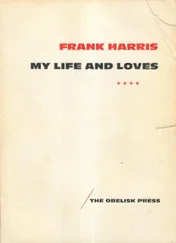Frank Harris - My life and loves Vol. 2
Здесь есть возможность читать онлайн «Frank Harris - My life and loves Vol. 2» весь текст электронной книги совершенно бесплатно (целиком полную версию без сокращений). В некоторых случаях можно слушать аудио, скачать через торрент в формате fb2 и присутствует краткое содержание. Жанр: Эротика, Секс, на английском языке. Описание произведения, (предисловие) а так же отзывы посетителей доступны на портале библиотеки ЛибКат.
- Название:My life and loves Vol. 2
- Автор:
- Жанр:
- Год:неизвестен
- ISBN:нет данных
- Рейтинг книги:4 / 5. Голосов: 1
-
Избранное:Добавить в избранное
- Отзывы:
-
Ваша оценка:
- 80
- 1
- 2
- 3
- 4
- 5
My life and loves Vol. 2: краткое содержание, описание и аннотация
Предлагаем к чтению аннотацию, описание, краткое содержание или предисловие (зависит от того, что написал сам автор книги «My life and loves Vol. 2»). Если вы не нашли необходимую информацию о книге — напишите в комментариях, мы постараемся отыскать её.
My life and loves Vol. 2 — читать онлайн бесплатно полную книгу (весь текст) целиком
Ниже представлен текст книги, разбитый по страницам. Система сохранения места последней прочитанной страницы, позволяет с удобством читать онлайн бесплатно книгу «My life and loves Vol. 2», без необходимости каждый раз заново искать на чём Вы остановились. Поставьте закладку, и сможете в любой момент перейти на страницу, на которой закончили чтение.
Интервал:
Закладка:
Frank Harris
My life and loves Vol. 2
FOREWORD
The first volume of my autobiography was condemned savagely from one end of the English-speaking world to the other and especially by selfstyled men of letters and journalists. One would have said that I had taken the bread out of their mouths, they made such an outcry. Strangely enough, the anathemas were louder and bitterer in England than in America; but what touched me more nearly, there were two notable exceptions. Bernard Shaw wrote that he could have defended the book had it not been for the illustrations, which were for the most part photographs of pretty, naked girls-at worst inoffensive, I should have thought. Mencken, however, the best of American critics, went further than Shaw and declared boldly in print that the sex-urge, being the chief emotion in a healthy boy, should be described plainly; at the same time expressing his belief that if I pictured my later life in London as frankly, it would be a great human document.
Two righteous in two hundred millions. I hadn't expected a much larger proportion and their quality gives me hope. To alter long-established convention is difficult and dangerous and requires time. It is now some fifty years since some of us began to question the benefits of vaccination. Alfred Russel Wallace, Bernard Shaw and others have written and spoken against it; but the authorities, doctor-driven, made this inoculation with cow-pox compulsory and answered our reasonable arguments with force and various punishments. Yet we had right and reason on our side. Take one fact: in 1914, the last year for which we have official figures, there were four deaths from small-pox registered in Great Britain and six deaths from vaccination; to say nothing of the dozens that were not accurately reported, owing to the prepossession of the ordinary medical attendant. One such fact, you would think, would give any one pause. But you have men of sense and learning like Sir Henry Maine writing that "compulsory vaccination (inoculation with cow-pox) is in the utmost danger," not because there are-more deaths year after year in Great Britain from the remedy than there are from the disease but, if you please, because of "the gradual establishment of the masses in power," which is, he adds, "of the blackest omen for all legislation founded on scientific opinion." By "scientific opinion" in this case he means doctors' fees!
The childish unreason of the world fills me with fear for the future of humanity. On all sides I still hear idiotic defences of the World War in spite of its fifty millions of untimely deaths and the consequent misery and impoverishment of our whole generation. The lying slogan, "the war to end war," has not even put an end to armaments or munitions-makers. The old lies are as popular as ever and pass uncontradicted, almost unquestioned.
Science is giving us every day new powers, and with the decline of religion our morality has positively diminished, not to say disappeared. The nations are growing daily stronger and more selfish. The struggle between the nations for world empire may be said to have had its first act in the World War. It looks as if the United States and the English Confederation were sure to emerge as the most powerful; with Russia next in the race. But if the combative spirit in the individual is not repressed, there may yet be wars of annihilation wherein the present races of men may be blotted out. It is our task to form if we can a new religion or at least a new morality. And the new moral laws must be laws of health and laws of reason. We have been told a good deal about our duty to our neighbour; but first we must learn our duty to ourselves and we must study our bodies at least as carefully as our minds.
The English and American people have enormous, preponderant power, power of numbers, power of wealth, power of almost unassailable position; but who does not see that their strength is out of all proportion to their brains.
They are at the head of the industrial world; but they have no corresponding position in the world of science, or art or literature. We must copy the Germans and endow scientific research; we must copy the French and endow the arts and we must certainly imitate them by freeing literature from the silly prohibitions of an outworn Puritanism. That at least is my most mature opinion, and accordingly I have taken it on myself to set the example in this field. Does anyone imagine that we can hope to produce a greater Balzac while respecting the conventions of the Sunday School and using euphemisms such as our "little Mary"?
Everyone admits today that painters and sculptors should be free to represent the naked human figure, but the moment a writer claims similar freedom he is boycotted and disgraced, his books are seized and burned and he may think himself lucky if he escapes fine and imprisonment. Yet the evil results of this ostrich policy are surely plain enough and well enough known.
In this volume, in which I propose to tell the intimate history of half a dozen famous contemporaries, the three greatest and most famous died in the flower of manhood of syphilis and two of the three were English. In the World War more than one in four of our American officers had suffered or was suffering from this foul disease. It is bred and fostered by secrecy and prudery: Voltaire knew that "when modesty goes out of manners, (moeurs, Lat: mores) it goes into speech."
No one need read our books unless they wish to; the conventiclers and churches will always be able to signify their disapprobation; but why should they be allowed to make of their prejudice a law and punish others for not rejoicing in their blindness? No one can answer Milton's plea in favour of always letting "truth grapple with falsehood."
In this matter the time-spirit is with me and all the highest authorities. In France Flaubert was prosecuted for writing and publishing Madame Bovary; but a generation later the Nona of Zola passed unpersecuted and a generation later still La garconne of Victor Marguerite was published freely.
In England too there is progress, but it is backward. Thirty years ago Burton was allowed to publish his Arabian Nights privately, and send it through the post; today he would be imprisoned for the crime. Yet the greatest writers are all in favour of freedom. I want the unprejudiced to consider a few of the undoubted authorities.
One evening after dinner Goethe read to Eckermann several scenes from Hanswurst's Hochzeit, or John Sausage's Marriage, written or at least begun in the poet's prime; Eckermann compares it with Faust for creative vigour and freedom; but adds at once that it goes "beyond all limits"; and he can not even give any excerpt to show its force and freedom. Goethe himself admits that he cannot publish it in Germany. "In Paris I would have been able to publish it," he adds, "but not in Frankfort or Weimar."
This shows sufficiently what Goethe's opinion on free speech was; for the limits in Germany were and are far wider than in England or America. Let me quote another and equally great writer. Here is a small part of what Montaigne wrote on this subject, and Montaigne, as Sainte-Beuve declares is "the wisest of all Frenchmen"; I use Florio's translation: Non pudeat dicere quod non pudeat sentire-"Let us not be ashamed to speak what we shame not to think… For my part I am resolved to dare speak whatsoever I dare do.
And am displeased with thoughts not to be published. The worst of my actions or conditions seem not so ugly unto me as I finde it both ugly and base not to dare to avouch them…" And again-"Both wee and they (men and women) are capable of a thousand more hurtful and unnatural corruptions than is lust or lasciviousness. But wee frame vices and weigh sinnes not according to their nature but according to our interest…" And still in the same chapter: "What monstrous beaste is this whom his delights displease…" And finally: "Few I know will snarle at the liberty of my writings that have not more cause to snarle at their thoughts-looseness."
Читать дальшеИнтервал:
Закладка:
Похожие книги на «My life and loves Vol. 2»
Представляем Вашему вниманию похожие книги на «My life and loves Vol. 2» списком для выбора. Мы отобрали схожую по названию и смыслу литературу в надежде предоставить читателям больше вариантов отыскать новые, интересные, ещё непрочитанные произведения.
Обсуждение, отзывы о книге «My life and loves Vol. 2» и просто собственные мнения читателей. Оставьте ваши комментарии, напишите, что Вы думаете о произведении, его смысле или главных героях. Укажите что конкретно понравилось, а что нет, и почему Вы так считаете.






![William Frith - John Leech, His Life and Work. Vol. 1 [of 2]](/books/747171/william-frith-john-leech-his-life-and-work-vol-thumb.webp)
![William Frith - John Leech, His Life and Work, Vol. 2 [of 2]](/books/748201/william-frith-john-leech-his-life-and-work-vol-thumb.webp)




